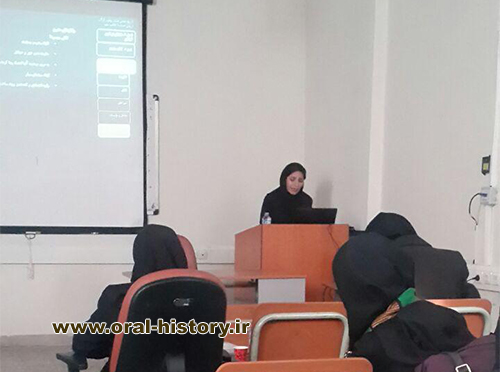Oral History and Resource Production
Maryam Rajabi
Translated by Natalie Haghverdian
2017-01-22
According to Iran Oral History Website, on 16 January 2017, Faezeh Kavian had her thesis defense session on “Oral History of Imam Khomeini Street (Pahlavi) Gorgan” to graduate her Master’s degree in Iran Architecture studies from the faculty of Architecture and Urbanism from the University of Shahid Beheshti. Her advisors were Dr. Mehrdad Qayoumi and Seyedeh Mitra Hashemi and Hamidreza Pishvayi.
According to the dissertation summary, construction of this street was a turning point of many urban and social changes; events that were observed for the first time in this street and even the needs that the street brought about and addressed them itself. Before the street was constructed, no one would think that it might turn into the center of the city and a place for various gatherings. Through the resettlement of the shops from the old market to the street and demolition of the old market this street became the main market of the city and a place to hold various events including religious celebrations that were held in Qeysariyeh area in the old market before.
The aim of this research is to introduce the street, and to present public perception of Gorgan Street and how they dealt with new events occurring in this street. In written literature available, public perception on surrounding events are less addressed. Hence, oral resources have a critical role in realization of the objectives of this study. In this study, upon review of the information gathered from oral sources and completion of such information using other sources, historic interpretation method was applied to gain a proper understanding on its structure and the life going on in it. According to the results of the studies conducted, at the beginning, the residents of Gorgan Street were not very keen about it and the efforts of Pahlavi to boost the street were ineffective since Pahlavi Gorgan Street was a place to be seen; a place for emerge of trappings of modernity; and center of governance and governmental buildings.
In the defense session, the student presented her dissertation and then the professors commented on her presentation methodology and stated the weaknesses and strengths of her thesis and provided recommendations with the aim of improving such efforts.

According to Faezeh Kavian, she had prepared a questionnaire before public interviews and she tried to improve her knowledge on the topic using written literature and other available resources to be able to build trust in public for her interviews, since building trust is one of the key principles of oral history. She added that while conducting the interviews she would point out events and incidents that the people were unaware of which was interesting for them. Also, during the interviews, she would name places which would revive memories of events that had not been discussed before that would automatically raise new questions.
She interviewed 30 people with a deep knowledge on the street and these individuals introduced new sources which expanded the scope of the interviews. For instance, one of the issues discussed were religious minorities living outside Gorgan which convinced the author to travel there to interview their descendants.
Fatemeh Goldar, one of the professors present in this dissertation defense stated the strong points of her studies which were special attention to oral history, inclusion of religious minorities, and different social casts including women in the interviews, and the public and historical images and evidence documents.
Hashemi said: The dissertation title was Oral History and Ms. Kavian has not only studied the written literature but also the oral history sources. Considering that oral history sources have weaknesses and strengths that could have affected her work, she has tried to authenticate public memoirs.
Qayoumi said: it is a misperception that oral history sources have to be oral. In fact, oral history is the root of resource production. When we started our studies, we had no knowledge about this street and the information that we have today is all authenticated based on the memoirs of a few descendants. It was an effort to organize and elaborate the information, to provide a strategy to use such information and create a sample work and now others can use such sources in their studies.
This dissertation succeeded in its quest by obtaining a grade of 188.
Number of Visits: 5155
http://oral-history.ir/?page=post&id=6818
